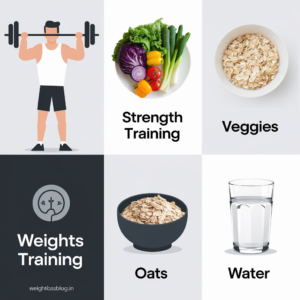The Essential Do’s and Don’ts of the Mayo Clinic Diet for Weight Loss
Introduction
The Mayo Clinic Diet is a flexible, balanced approach to weight loss that focuses on making healthy lifestyle changes rather than following strict rules or restrictive eating patterns. By emphasizing whole foods, portion control, and regular physical activity, the Mayo Clinic Diet promotes sustainable weight loss and overall well-being. To  get the most out of this diet, it’s important to follow the right guidelines. This list of do’s and don’ts will help you navigate the Mayo Clinic Diet and achieve your weight loss goals while staying healthy.
get the most out of this diet, it’s important to follow the right guidelines. This list of do’s and don’ts will help you navigate the Mayo Clinic Diet and achieve your weight loss goals while staying healthy.
Do’s of the Mayo Clinic Diet
1. Do Focus on Whole, Nutrient-Dense Foods
The Mayo Clinic Diet encourages the consumption of whole, minimally processed foods that are rich in vitamins, minerals, and fiber. Focus on fruits, vegetables, whole grains, lean proteins, and healthy fats to ensure you’re getting the nutrients your body needs while staying within your calorie goals.
Eating whole, nutrient-dense foods will help you feel fuller and more satisfied while promoting long-term weight loss and better health.
2. Do Incorporate Regular Physical Activity
Exercise is an important part of the Mayo Clinic Diet. Aim for at least 150 minutes of moderate-intensity activity each week, such as brisk walking, swimming, or cycling. Physical activity not only helps with weight loss but also improves your cardiovascular health, muscle strength, and overall fitness.
Incorporating regular physical activity will enhance your weight loss efforts and improve your overall well-being on the Mayo Clinic Diet.
3. Do Be Mindful of Portion Sizes
While the Mayo Clinic Diet doesn’t involve strict calorie counting, portion control is still important for weight loss. Use smaller plates, measure your servings, and avoid going back for seconds to help control your portion sizes. Being mindful of how much you’re eating will help you maintain a calorie deficit and achieve your weight loss goals.
Controlling your portion sizes will help you avoid overeating and promote gradual, sustainable weight loss.
4. Do Plan Your Meals in Advance
Meal planning is a key strategy for success on the Mayo Clinic Diet. Prepare healthy meals and snacks in advance to ensure you’re sticking to the diet’s guidelines and avoiding unhealthy options. Having nutritious meals ready to go will make it easier to stay on track, even when you’re busy or on the go.
Planning your meals ahead of time will help you make healthier choices and stay committed to the Mayo Clinic Diet.
5. Do Be Patient with the Process
The Mayo Clinic Diet promotes gradual, sustainable weight loss rather than quick fixes. It may take time to see significant changes in your weight, but the long-term results are worth the effort. Be patient and stay consistent with your  healthy habits, and you’ll achieve lasting success.
healthy habits, and you’ll achieve lasting success.
Being patient with the process will help you stay motivated and committed to your weight loss journey on the Mayo Clinic Diet.
Don’ts of the Mayo Clinic Diet
1. Don’t Skip Meals
Skipping meals can lead to overeating later in the day and disrupt your weight loss progress. It’s important to eat balanced meals and snacks throughout the day to keep your energy levels stable and prevent hunger. The Mayo Clinic Diet emphasizes regular, nutritious meals to support your overall health and weight loss goals.
Eating regular meals will help you stay satisfied and avoid overeating on the Mayo Clinic Diet.
2. Don’t Focus on Restrictive Eating
Unlike fad diets that eliminate entire food groups or severely restrict calories, the Mayo Clinic Diet encourages a balanced approach to eating. Avoid overly restrictive eating patterns, as they can lead to nutrient deficiencies and make it difficult to sustain long-term weight loss. Focus on moderation and variety instead of cutting out specific foods.
Following a balanced, moderate approach will help you create a sustainable eating pattern that promotes long-term weight loss success.
3. Don’t Rely on Processed Foods
The Mayo Clinic Diet encourages the consumption of whole, minimally processed foods, so it’s important to avoid relying on packaged and processed foods. These foods are often high in added sugars, unhealthy fats, and empty calories, which can hinder your weight loss progress. Choose fresh, whole foods whenever possible.
Avoiding processed foods will help you stick to the principles of the Mayo Clinic Diet and promote better overall health.
4. Don’t Neglect Hydration
Staying hydrated is essential for weight loss and overall health. Drinking enough water can help you feel full, support digestion, and prevent overeating. Make sure to  drink at least 8 glasses of water per day, and avoid sugary beverages that can add unnecessary calories to your diet.
drink at least 8 glasses of water per day, and avoid sugary beverages that can add unnecessary calories to your diet.
Staying hydrated will support your weight loss efforts and keep your body functioning optimally on the Mayo Clinic Diet.
5. Don’t Expect Immediate Results
The Mayo Clinic Diet promotes gradual weight loss, which may take time to become noticeable. It’s important not to get discouraged if you don’t see immediate results. Focus on building healthy habits and making long-term changes rather than expecting rapid weight loss.
Being realistic about the pace of your progress will help you stay motivated and committed to the Mayo Clinic Diet.
Conclusion
The Mayo Clinic Diet is a balanced, sustainable approach to weight loss that promotes healthy eating habits, regular physical activity, and mindful lifestyle changes. By following these essential do’s and don’ts, you can maximize your success on the Mayo Clinic Diet and achieve your weight loss goals while maintaining a balanced, nutritious eating plan. Focus on whole foods, portion control, and staying active to ensure long-term success on your weight loss journey.